December 14, 2021 at 7:22 pm
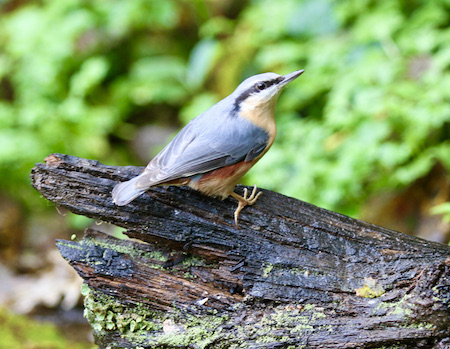 Still with mobility problems so I have spent most of the last two weeks watching the feeding birds in the garden. On most days we have had twenty or more different species taking food which for the size of the garden is amazing.By far the largest bird has been the male Pheasant who first appeared last year – but is it the same male as last year? Nuthatches come regularly and the immaculate male Sparrowhawk finally perched facing us thus giving a great view of his orange breast.www.facebook.com/gordonyateswildlife
Still with mobility problems so I have spent most of the last two weeks watching the feeding birds in the garden. On most days we have had twenty or more different species taking food which for the size of the garden is amazing.By far the largest bird has been the male Pheasant who first appeared last year – but is it the same male as last year? Nuthatches come regularly and the immaculate male Sparrowhawk finally perched facing us thus giving a great view of his orange breast.www.facebook.com/gordonyateswildlife
December 5, 2021 at 10:38 am
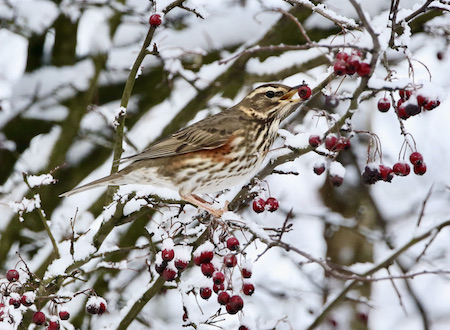 Monday’s snow and ice was perfect for catching up with feeding Redwings. So far this winter there have been very few about but I managed to locate half a dozen feeding on Haws on one of Rochdales busiest roads. In-between passing buses, lorries, cars and people they fed and provided me with the photos I was hoping for. I then went stalking Roe Deer and fell into a snow-covered pot hole damaging my left knee – but don’t worry the camera was OK!! See Gallery www.facebook.com/gordon
Monday’s snow and ice was perfect for catching up with feeding Redwings. So far this winter there have been very few about but I managed to locate half a dozen feeding on Haws on one of Rochdales busiest roads. In-between passing buses, lorries, cars and people they fed and provided me with the photos I was hoping for. I then went stalking Roe Deer and fell into a snow-covered pot hole damaging my left knee – but don’t worry the camera was OK!! See Gallery www.facebook.com/gordon
November 28, 2021 at 4:06 pm
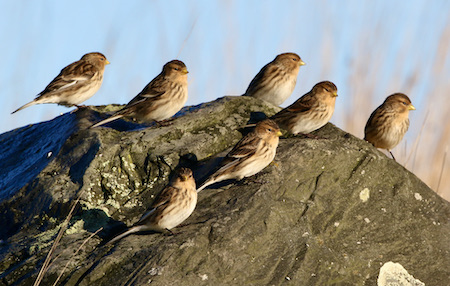 When I started filming birds fifty one years ago the commonest moorland bird was the Twite or Mountain Linnet as it was locally called. You could walk the moors in July and come across half a dozen nests without really trying.The whole Pennine population must have been well over a thousand pairs.
When I started filming birds fifty one years ago the commonest moorland bird was the Twite or Mountain Linnet as it was locally called. You could walk the moors in July and come across half a dozen nests without really trying.The whole Pennine population must have been well over a thousand pairs.
Last week the RSPB announced that this year there may have been only a dozen breeding pairs in the whole of the Pennines. Its a sorry tale of overgrazing by sheep and cattle plus the loss of Hay meadows – the Twite feeds almost exclusively on seed. This weeks blog and gallery photos were taken a few days ago after constant baiting with Niger seed. Some of the birds in the flock of thirty would have come down from Scotland where they are still holding their own.www.facebook.com/gordon
November 21, 2021 at 7:16 pm
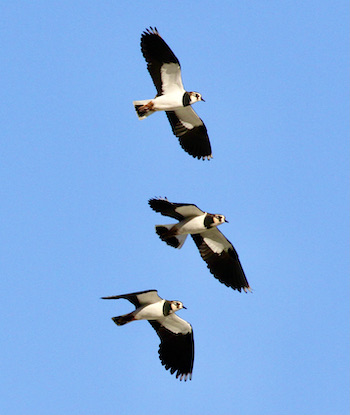 The practice of Lapwings roosting on the roof of Industrial Units has been going on locally for more than thirty years. In fact it started in Manchester and has now spread throughout the whole of Britain. My local flock peaked at 350 last week and may well increase further as Winter progresses.
The practice of Lapwings roosting on the roof of Industrial Units has been going on locally for more than thirty years. In fact it started in Manchester and has now spread throughout the whole of Britain. My local flock peaked at 350 last week and may well increase further as Winter progresses.
From the camera point of view the Lapwings frequently get spooked and fly around before landing again on the same roof or sometimes a different one. If the sun and wind are favourable you can obtain some great photos from underneath as the birds land again.See the Gallery for last week’s photos.www.facebook.com/gordon
November 14, 2021 at 8:10 pm
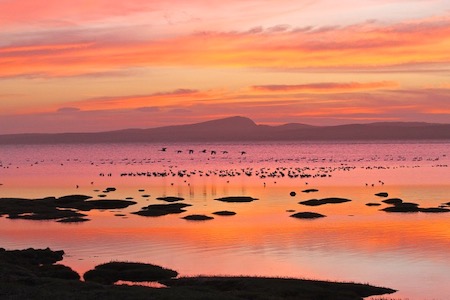 For more than thirty years we have had a week on Islay in Autumn to film the Swans and Geese as they arrive from the Arctic – but not this year. Why not this year you might ask and the answer is the stormy weather that prevails in Autumn resulting in closed roads, cancelled ferries and now Covid. It is a sad gap in my filming year for to me there is no finer sight in Autumn than to stand at the head of Loch Indaal, at sunset, and watch the Swans and Geese coming to spend the night on the sands against the backdrop of a classic Hebridean sunset.This year there is the added bonus of a dozen Sea Eagles trying to catch them as they come to roost – perhaps next year!!gallery www.facebook.com/gordon
For more than thirty years we have had a week on Islay in Autumn to film the Swans and Geese as they arrive from the Arctic – but not this year. Why not this year you might ask and the answer is the stormy weather that prevails in Autumn resulting in closed roads, cancelled ferries and now Covid. It is a sad gap in my filming year for to me there is no finer sight in Autumn than to stand at the head of Loch Indaal, at sunset, and watch the Swans and Geese coming to spend the night on the sands against the backdrop of a classic Hebridean sunset.This year there is the added bonus of a dozen Sea Eagles trying to catch them as they come to roost – perhaps next year!!gallery www.facebook.com/gordon
November 7, 2021 at 6:37 pm

As soon as the crop of Acorns has gone in the Countryside the Jays will descend on our gardens. Peanuts are the attraction and this last week we have had at least three competing for the spoils. The light has been quite poor but some photos are in this weeks gallery. www.facebook.com/gordon
 Still with mobility problems so I have spent most of the last two weeks watching the feeding birds in the garden. On most days we have had twenty or more different species taking food which for the size of the garden is amazing.By far the largest bird has been the male Pheasant who first appeared last year – but is it the same male as last year? Nuthatches come regularly and the immaculate male Sparrowhawk finally perched facing us thus giving a great view of his orange breast.www.facebook.com/gordonyateswildlife
Still with mobility problems so I have spent most of the last two weeks watching the feeding birds in the garden. On most days we have had twenty or more different species taking food which for the size of the garden is amazing.By far the largest bird has been the male Pheasant who first appeared last year – but is it the same male as last year? Nuthatches come regularly and the immaculate male Sparrowhawk finally perched facing us thus giving a great view of his orange breast.www.facebook.com/gordonyateswildlife

 Monday’s snow and ice was perfect for catching up with feeding Redwings. So far this winter there have been very few about but I managed to locate half a dozen feeding on Haws on one of Rochdales busiest roads. In-between passing buses, lorries, cars and people they fed and provided me with the photos I was hoping for. I then went stalking Roe Deer and fell into a snow-covered pot hole damaging my left knee – but don’t worry the camera was OK!! See Gallery www.facebook.com/gordon
Monday’s snow and ice was perfect for catching up with feeding Redwings. So far this winter there have been very few about but I managed to locate half a dozen feeding on Haws on one of Rochdales busiest roads. In-between passing buses, lorries, cars and people they fed and provided me with the photos I was hoping for. I then went stalking Roe Deer and fell into a snow-covered pot hole damaging my left knee – but don’t worry the camera was OK!! See Gallery www.facebook.com/gordon When I started filming birds fifty one years ago the commonest moorland bird was the Twite or Mountain Linnet as it was locally called. You could walk the moors in July and come across half a dozen nests without really trying.The whole Pennine population must have been well over a thousand pairs.
When I started filming birds fifty one years ago the commonest moorland bird was the Twite or Mountain Linnet as it was locally called. You could walk the moors in July and come across half a dozen nests without really trying.The whole Pennine population must have been well over a thousand pairs. The practice of Lapwings roosting on the roof of Industrial Units has been going on locally for more than thirty years. In fact it started in Manchester and has now spread throughout the whole of Britain. My local flock peaked at 350 last week and may well increase further as Winter progresses.
The practice of Lapwings roosting on the roof of Industrial Units has been going on locally for more than thirty years. In fact it started in Manchester and has now spread throughout the whole of Britain. My local flock peaked at 350 last week and may well increase further as Winter progresses. For more than thirty years we have had a week on Islay in Autumn to film the Swans and Geese as they arrive from the Arctic – but not this year. Why not this year you might ask and the answer is the stormy weather that prevails in Autumn resulting in closed roads, cancelled ferries and now Covid. It is a sad gap in my filming year for to me there is no finer sight in Autumn than to stand at the head of Loch Indaal, at sunset, and watch the Swans and Geese coming to spend the night on the sands against the backdrop of a classic Hebridean sunset.This year there is the added bonus of a dozen Sea Eagles trying to catch them as they come to roost – perhaps next year!!gallery www.facebook.com/gordon
For more than thirty years we have had a week on Islay in Autumn to film the Swans and Geese as they arrive from the Arctic – but not this year. Why not this year you might ask and the answer is the stormy weather that prevails in Autumn resulting in closed roads, cancelled ferries and now Covid. It is a sad gap in my filming year for to me there is no finer sight in Autumn than to stand at the head of Loch Indaal, at sunset, and watch the Swans and Geese coming to spend the night on the sands against the backdrop of a classic Hebridean sunset.This year there is the added bonus of a dozen Sea Eagles trying to catch them as they come to roost – perhaps next year!!gallery www.facebook.com/gordon